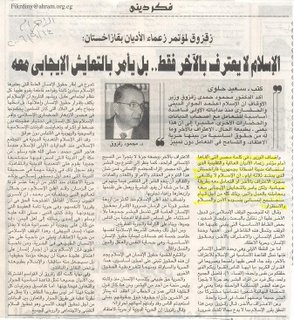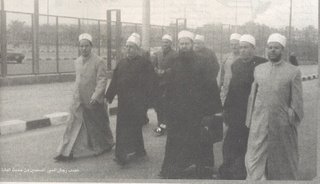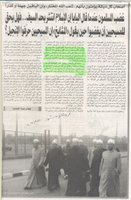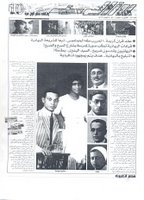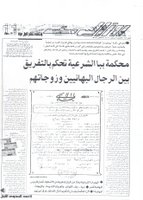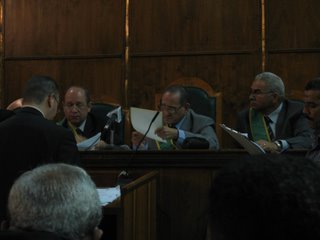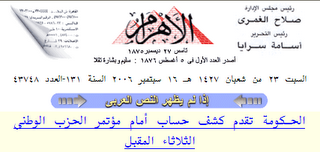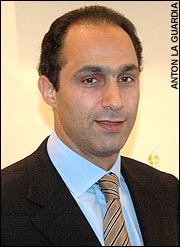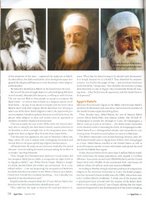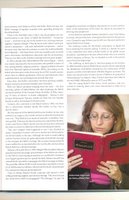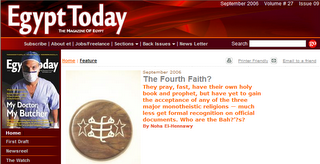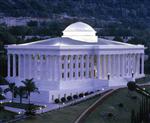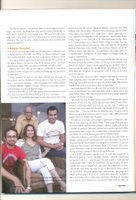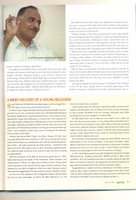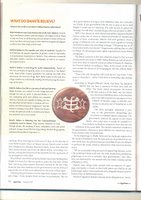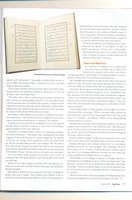 Today, 15 September 2006, the US Department of State released its International Religious Freedom Report for the year 2006. The report opens with description of the current status of the Baha'is of Egypt. The full report on Egypt can be accessed here. Report on Iran can be seen here. For reports on other countries please click here. The Executive Summary can be seen in English here, and in Arabic here.
Today, 15 September 2006, the US Department of State released its International Religious Freedom Report for the year 2006. The report opens with description of the current status of the Baha'is of Egypt. The full report on Egypt can be accessed here. Report on Iran can be seen here. For reports on other countries please click here. The Executive Summary can be seen in English here, and in Arabic here.
The following quotes are the first two paragraphs of the report:
"The constitution provides for freedom of belief and the practice of religious rites, although the Government places restrictions on these rights in practice. Islam is the official state religion and Shari'a (Islamic law) is the primary source of legislation; religious practices that conflict with the Government's interpretation of Shari'a are prohibited. Members of non-Muslim religious minorities officially recognized by the Government generally worship without harassment and maintain links with coreligionists in other countries; however, members of religious groups that are not recognized by the Government, particularly the Baha'i Faith, experience personal and collective hardship."
"There was no significant change in the status of respect for religious freedom during the period covered by this report. The Government opposed advances in the respect for religious freedom affecting Baha'is; there continued to be abuses and numerous restrictions, and some improvements. It appealed an April 4 decision by the Administrative Court which supported the right of Baha'i citizens to receive ID cards and birth certificates with religion noted on the documents."
Later on, the report states:
"Tradition and some aspects of the law discriminated against religious minorities, including Christians and particularly Baha'is. The Government also continued to deny civil documents, including identity cards, birth certificates, and marriage licenses, to members of the Baha'i community, which numbered 500 to 2000 persons."
Under "Section I. Religious Demography" it states:
"The country has an area of 370,308 square miles, and its population, as of June 2006, was approximately 73.7 million, of whom almost 90 percent were estimated to be Sunni Muslims. Shi'a Muslims constituted less than 1 percent of the population. Estimates of the percentage of Christians in the population ranged from 8 percent to 15 percent, or between 6 to 11 million, the majority of whom belonged to the Coptic Orthodox Church."
"Other Christian communities included the Armenian Apostolic, Catholic (Armenian, Chaldean, Greek, Melkite, Roman, and Syrian Catholic), Maronite, and Orthodox (Greek and Syrian) churches. An evangelical Protestant church, established in the middle of the nineteenth century, included sixteen Protestant denominations. There also were followers of the Seventh-day Adventist Church, which was granted legal status in the 1960s. There were small numbers of Mormons and members of Jehovah's Witnesses, but the Government does not recognize either group. The non-Muslim, non-Coptic Orthodox communities ranged in size from several thousand to hundreds of thousands. The number of Baha'is was estimated at between 500 and 2 thousand persons. The Jewish community numbered fewer than 200 persons."
Under "Section II. Status of Religious Freedom--Legal/Policy Framework" it states:
"The constitution, under Article 46, provides for freedom of belief and the practice of religious rites; however, the Government places restrictions on these rights in practice. Islam is the official state religion, and Shari'a is the primary source of legislation; religious practices that conflict with the Government's interpretation of Shari'a are prohibited. Members of the non-Muslim religious minorities generally worship without legal harassment and may maintain links with coreligionists in other countries. Members of other religious groups that are not recognized by the Government, particularly the Baha'i Faith, continue to experience personal and collective hardship."
"The Government continued to encourage interfaith dialogue. The religious establishment of Al-Azhar and the Ministry of Awqaf (Religious Endowments and Islamic Affairs) engaged in interfaith discussions, both domestically and abroad. In 2004 the Government announced the formation of the quasi-governmental National Council for Human Rights (NCHR), on which five of the twenty-five appointed members, as well as the president, are Copts. The NCHR is charged with furthering protections, raising awareness, and ensuring the observance of human rights and fundamental freedoms, including religious freedom. It is also charged with monitoring enforcement and application of international agreements. The council gave only superficial attention to the issue of religious freedom in its first annual report. In its second report, released in March, the council called for a solution for official recognition of Baha'is; addressed the problem of Jehovah's Witnesses; and criticized religious textbooks in schools for failing to address human rights topics. The report also recommended that Parliament pass a law that would facilitate the construction of new places of worship for all religious groups. Finally, the report noted that the council had not received any response from the Ministry of Interior or several governorates to its nine inquiries related to numerous complaints of alleged violations of religious freedom that it had received."
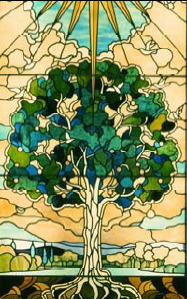 Tree of Life (Charles Williams)
Tree of Life (Charles Williams)
Under "Restrictions on Religious Freedom" it states:
"The Government continued to deny civil documents, including ID cards, birth certificates, and marriage licenses, to members of the Baha'i community. The Government appealed an April 4, 2006 decision by the Administrative Court which supported the right of Baha'i citizens to receive ID cards and birth certificates with religion noted on the documents. On June 19, the Administrative Court postponed the appeal hearing to September 16."
"Law 263 of 1960, still in force, bans Baha'i institutions and community activities, and a 1961 presidential decree stripped Baha'is of legal recognition. During the Nasser era, the Government confiscated all Baha'i community properties, including Baha'i centers, libraries, and cemeteries. The Government has asserted that national identity cards require all citizens to be categorized as Muslims, Christians, or Jews. The Ministry of Interior has reportedly, on rare occasions, issued documents that list a citizen's religion as "other" or simply do not include mention of religion. But it is not clear when these conditions apply. Baha'is and other religious groups that are not associated with any of the three "heavenly religions" have been compelled either to misrepresent themselves or go without valid identity documents."
"Those without valid identity cards encounter difficulty registering their children in school, opening bank accounts, and establishing businesses. Baha'is at age sixteen face additional problems under Law 143/1994, which makes it mandatory for all citizens to obtain a new identification card featuring a new national identification number. Police, often on public buses, conduct random inspections of identity papers, and those found without their identity card are regularly detained until the document is provided to the police. Some Baha'is without identity cards frequently stay home to avoid police scrutiny and possible arrest."
"In May 2004 the Government confiscated the identity cards of two Baha'is who were applying for passports. Officials told them that they were acting on instructions from the MOI to confiscate any identity cards belonging to Baha'is."
"In 1997 a human rights activist filed a lawsuit seeking the removal of the religious affiliation category from government identification cards. The plaintiff challenged the constitutionality of a 1994 decree by the MOI governing the issuance of new identification cards. A hearing scheduled for February 25, 2005, never took place. The court informed the attorney for the plaintiff that the case documents had been withdrawn and forwarded to the president of the State's Council, a highly unusual procedure. In December the court dismissed the appeal on a technicality, arguing that the complainant failed to file the appeal within sixty days after the decree had been published in the Government's Official Gazette in 1995."
Under "Abuses of Religious Freedom" it states:
"Al-Azhar's Islamic Research Center issued a legal opinion in December 2003 condemning Baha'is as apostates. In May 2006 the minister of justice requested guidance from the IRC in preparation for the Government's appeal against the landmark April 4 case in support of Baha'i rights. The IRC issued an Islamic legal interpretation stating that the Baha'i Faith was a "heresy." The 2006 interpretation referenced a 1985 opinion that had accused Baha'is of working in support of Zionism and imperialism, and labeled them as "apostates"."
Under "Improvements and Positive Developments in Respect for Religious Freedom" it states:
"In March 2006 the NCHR released its second annual report, in which it recommended a solution for official recognition of Baha'is, addressed the problem of Jehovah's Witnesses in the country, and criticized religious textbooks in schools for failing to address human rights topics. The report also encouraged the Government to pass a law for all religious groups addressing the construction of new places of worship."
Under "Section IV. U.S. Government Policy" it states:
"Religious freedom is an important part of the bilateral dialogue. The right of religious freedom has been raised with senior government officials by all levels of the U.S. government, including by visiting members of congress, the secretary of state, assistant secretary for Near Eastern Affairs, the ambassador, and other Embassy officials. The embassy maintains formal contacts with the Office of Human Rights at the Ministry of Foreign Affairs. The embassy also discusses religious freedom issues regularly in contacts with other government officials, including governors and members of parliament. The ambassador has made public statements supporting interfaith understanding and efforts toward harmony and equality among citizens of all religious groups. Specifically, the embassy has raised its concerns about official discrimination against Baha'is with the Government. The Government insists that religious identification on national identity cards is necessary to determine which laws apply in civil cases."
Tomorrow, 16 September 2006, Egypt's Supreme Administrative Court will convene to decide on the Government's appeal of the lower Administrative Court's ruling which granted the Egyptian Baha'is their right to be recognized on official government documents as Baha'is.
 Another article was published in the daily independent newspaper "Nahdat Misr" (Rise & Renaissance of Egypt) on 21 September 2006, entitled "We want nothing more than the religious section [on ID cards]." The subtitle was "They said that it is incomprehensible that a five-year-old child remains without a birth certificate just because he is a Baha'i."
Another article was published in the daily independent newspaper "Nahdat Misr" (Rise & Renaissance of Egypt) on 21 September 2006, entitled "We want nothing more than the religious section [on ID cards]." The subtitle was "They said that it is incomprehensible that a five-year-old child remains without a birth certificate just because he is a Baha'i." The article states: "the last few months were not the beginning of Egypt's era for the Baha'i [Faith], the repeated flow of information confirms that the age of the Baha'i [Faith] in Egypt exceeds the period of a century...." It goes on to say, "we have not heard a single voice from the Baha'is in Egypt since the dissolution of the Baha'i Assemblies by the late president Gamal Abd el-Nasser in the fifties [1960]...."
The article states: "the last few months were not the beginning of Egypt's era for the Baha'i [Faith], the repeated flow of information confirms that the age of the Baha'i [Faith] in Egypt exceeds the period of a century...." It goes on to say, "we have not heard a single voice from the Baha'is in Egypt since the dissolution of the Baha'i Assemblies by the late president Gamal Abd el-Nasser in the fifties [1960]...." Later on after reporting on the usual false accusations that the "Baha'is are linked to the United States and Israel," he reported statements made by Dr. Basma Moussa, an Egyptian Baha'i and a surgeon at Cairo University, that "the recent movement by the Baha'is should be looked at in the context of implementing their citizenship rights after being cornered [left with no options], and all their livelihood affairs came to a halt as a result of the government's actions preventing them from obtaining official ID documents...."
Later on after reporting on the usual false accusations that the "Baha'is are linked to the United States and Israel," he reported statements made by Dr. Basma Moussa, an Egyptian Baha'i and a surgeon at Cairo University, that "the recent movement by the Baha'is should be looked at in the context of implementing their citizenship rights after being cornered [left with no options], and all their livelihood affairs came to a halt as a result of the government's actions preventing them from obtaining official ID documents...."




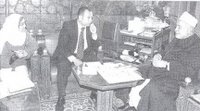
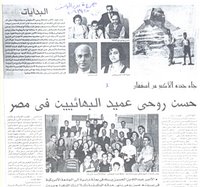
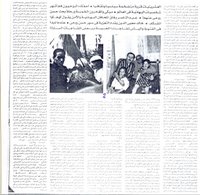
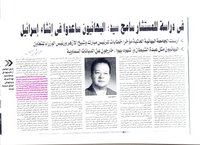


 Al-Mesreyoon (The Egyptians)
Al-Mesreyoon (The Egyptians)